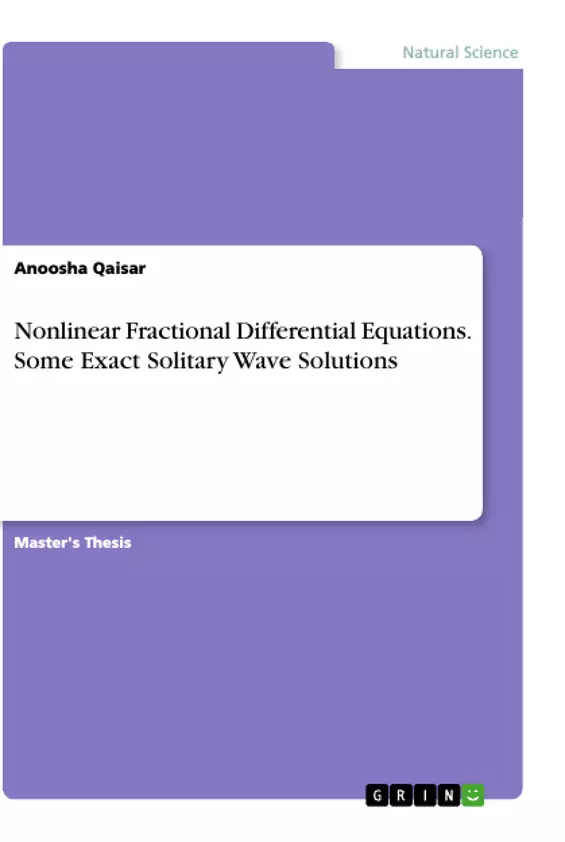The current study deals with distinct kinds of solitary wave solutions for the fractional generalized Duffing model and fractional diffusion reaction model with novel truncated M-fractional derivative. We are also interested in studying some special
cases of the fractional generalized Duffing model.
These are known as fractional Landau-Ginzburg-Higgs equation, classical fractional Klein-Gordon equation, the
Phi-4 equation, the Sine-Gordon equation and the Duffing equation. The obtained results can be used in describing these models in some better way. The novel fractional derivative operator namely M-fractional derivative is used to study the above-mentioned models. Also, the obtained results are verified via symbolic software Mathematica. A modified integration method, the extended Sinh-Gordon equation expansion method (EShGEEM) is employed to secure the aforesaid solitary wave solutions. Furthermore, the obtained results show that the suggested approach have broadened capacity to obtain the different wave solutions of the fractional differential equations effectively. At the end, the results are also explained through their graphical representations.
Inhaltsverzeichnis (Table of Contents)
- Abstract
- Acknowledgements
- Introduction and Preliminaries
- Truncated M-fractional Derivative and it's Properties:
- Description of the Scheme Strategy:
- Main Results-I
- Mathematical Analysis of the Fractional Generalized Reaction Duff-ing Model
- Solutions to Eq. (2.2) with the aforesaid approach
- The Landua-Ginburg-Higgs equation as a special case of Eq. (1.1)
- The classical fractional Klein-Gordon equation from Eq. (1.1)
- The solutions for Phi-4 equation
- The sine-Gordon equation as a special case of Eq. (1.1)
- The Duffing equation as a special case of Eq. (1.1)
- Main Results-II
- Mathematical Analysis of the Fractional Diffusion Reaction Modelwith its Solutions:
- Solutions to the diffusion reaction equation (3.1).
- Conclusion
- Bibliography
Zielsetzung und Themenschwerpunkte (Objectives and Key Themes)
This thesis examines the application of the truncated M-fractional derivative to obtain solitary wave solutions for both the fractional generalized Duffing model and the fractional diffusion reaction model. The work further explores specific cases of the fractional generalized Duffing model, including the fractional Landau-Ginzburg-Higgs equation, the classical fractional Klein-Gordon equation, the Phi-4 equation, the Sine-Gordon equation, and the Duffing equation. The obtained results offer potential insights into these models and their behavior.
- Analysis of fractional differential equations using the M-fractional derivative.
- Derivation of solitary wave solutions for the fractional generalized Duffing model and the fractional diffusion reaction model.
- Exploration of specific cases of the fractional generalized Duffing model, including the fractional Landau-Ginzburg-Higgs equation, the classical fractional Klein-Gordon equation, the Phi-4 equation, the Sine-Gordon equation, and the Duffing equation.
- Verification of obtained results using symbolic software.
- Application of the extended Sinh-Gordon equation expansion method (EShGEEM) to secure solitary wave solutions.
Zusammenfassung der Kapitel (Chapter Summaries)
- Introduction and Preliminaries: This chapter presents an overview of nonlinear partial differential equations (NLPDEs) and their importance in modeling various physical phenomena. The chapter also introduces the truncated M-fractional derivative and its properties, which are crucial for the subsequent analysis.
- Main Results-I: This chapter delves into the mathematical analysis of the fractional generalized Duffing model. It explores solutions obtained through the novel approach and examines specific cases of the model, including the Landau-Ginzburg-Higgs equation, the classical fractional Klein-Gordon equation, the Phi-4 equation, the Sine-Gordon equation, and the Duffing equation.
- Main Results-II: This chapter focuses on the fractional diffusion reaction model, examining its mathematical analysis and presenting solutions.
Schlüsselwörter (Keywords)
This research focuses on the application of the truncated M-fractional derivative to obtain solitary wave solutions for fractional differential equations, particularly the generalized Duffing model and the diffusion reaction model. Key terms include fractional differential equations, solitary wave solutions, truncated M-fractional derivative, the generalized Duffing model, the Landau-Ginzburg-Higgs equation, the classical fractional Klein-Gordon equation, the Phi-4 equation, the Sine-Gordon equation, the Duffing equation, and the diffusion reaction model.
Frequently Asked Questions
What are solitary wave solutions in differential equations?
Solitary wave solutions are wave packets that maintain their shape while traveling at constant speeds, often used to model physical phenomena in nonlinear systems.
What is the truncated M-fractional derivative?
The truncated M-fractional derivative is a novel mathematical operator used to study fractional differential equations with more precision and better properties than classical derivatives.
Which models are analyzed in this study?
The study analyzes the fractional generalized Duffing model and the fractional diffusion reaction model, including special cases like the Sine-Gordon and Klein-Gordon equations.
What is the EShGEEM method?
The extended Sinh-Gordon equation expansion method (EShGEEM) is a modified integration technique used to effectively secure solitary wave solutions for fractional differential equations.
How are the results of the mathematical analysis verified?
The obtained solitary wave solutions are verified using symbolic software like Mathematica and explained through detailed graphical representations.
- Quote paper
- Anoosha Qaisar (Author), 2021, Nonlinear Fractional Differential Equations. Some Exact Solitary Wave Solutions, Munich, GRIN Verlag, https://www.grin.com/document/1061186



